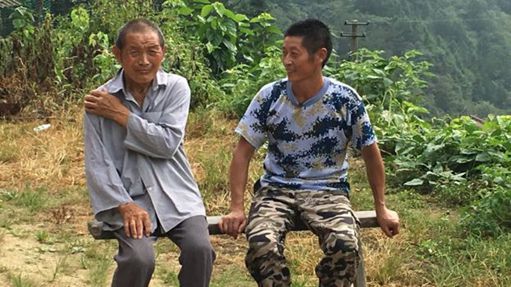导读:在中国,男大当婚女大当嫁。可是由于种种原因,单身汉却不少见,甚至在有些地方出现了“光棍村”。一起来了解下!

Xiong Jigen blames the road.
熊吉根把责任归咎于公路。
"It’s isolated and the transportation is very difficult," he says.
他说道:“这里与世隔绝,交通也相当闭塞。”
At 43, Mr Xiong is what is called a "bare branch" in China - single, unmarried.
43岁的熊先生在中国被称为“光棍”——单身、未婚。
This is the label given to men like him who have not found a wife, in a country where a man in his twenties is still expected to marry, provide a home and carry on his family line.
这是人们对和他一样未娶妻男性的称呼,在中国,男性到了20多岁就应成家立业,养家糊口和传宗接代。
He lives in Laoya village in a very rural part of Anhui province of eastern China.
他居住在中国东部安徽省一个十分偏远的老鸭村。
The immediate approach to the village is an hour-long slow drive up a dirt road.
到达该村最快的方法就是驾车在泥土路上慢行一个小时。
The bachelor village
光棍村
But Laoya is known locally as the "bachelor village".
但是老鸭村在当地被称为“光棍村”。
In a survey in 2014 it had 112 men between 30 and 55 registered as single out of a population of 1,600. That is unusually high.
在2014年的一项调查中,该村1600口人当中,30岁到50岁的单身男性就有112个,数量高得惊人。
Mr Xiong said he knew of more than 100 local men who were still unmarried: "I cannot find a wife, they migrate to somewhere else to work, then how can I find someone to marry?"
熊先生说他认识100多个当地未婚男性。“我娶不到媳妇,她们都到外地去工作了,那我还能找谁结婚?”
Then he mentioned the road again.
然后他再一次提到了公路问题。
"Transportation is so difficult here, we cannot go across the river when it rains. Women don’t want to settle down."
“这里的交通相当闭塞,下雨时,我们没法过河。妇女们都不愿在这儿定居。”
China has far more men than women.
中国的男性要远多于女性。
In a culture that historically favours boys over girls the Communist Party government’s One Child policy led to forced abortions and a glut of newborn boys from the 1980s onwards.
历史上,中国文化重男轻女,加之中共政府的独生子女政策,导致了20世纪80年代后出现了被迫堕胎和男孩出生过多现象的发生。
The result is a 21st Century male marriage squeeze.
其结果就是21世纪男性结婚困难。
’Nor too fat, nor too slim’
“不是很胖也不是很瘦”
Parents can still play a significant role in trying to fix up their children. Matchmakers are common in the villages.
父母亲在孩子的婚姻大事上发挥着重要作用。媒人在农村也很常见。
Mr Xiong said: "Some women visited here through matchmakers then left, because they had a terrible impression of the transportation."’
熊先生说道:“一些妇女通过媒人介绍来这儿看了看然后就走了,因为这里的交通给他们留下了很差的印象。”
As we stood in the doorway of his sparsely decorated bedroom, I asked if he had ever been in love.
当我们站在他那装修简陋的卧室时,我问他是否谈过恋爱。
"I was in a relationship before," he said, "but it didn’t work out. She complained that my village was not good for her, especially the roads."
他回答说“我曾经有过一段感情,但是没用。她抱怨我们村的条件不够好,尤其是公路。”
They’d met through a matchmaker. He went on to describe her: "She was almost as tall as me, not too fat nor too slim. She was quite extrovert."
他们通过媒人介绍认识。他继续描绘她:“她几乎和我一样高,不胖也不瘦。她十分外向。”
Women leave the village, as they do in other villages all over China, to head to the city for work.
跟中国其它农村的妇女一样,她们都离开农村到城市工作了。
This is not the only bachelor village. It presents the dilemmas of life in rural China: the relentless escape from poverty and being bound to the land, the gender imbalance, the duty to aging relatives.
这不仅仅是光棍村的问题。它还象征着中国农村的窘境:拼命摆脱贫穷,受到土地,性别不平等和对年老亲戚负责的束缚。







